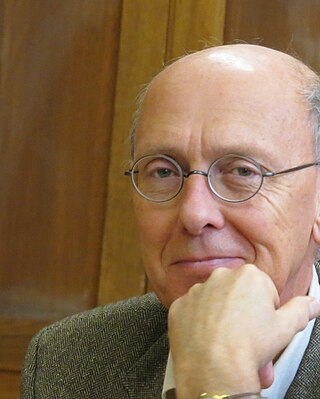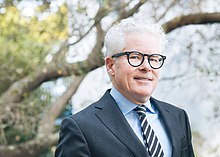Ethics is the philosophical study of moral phenomena. Also called moral philosophy, it investigates normative questions about what people ought to do or which behavior is morally right. Its main branches include normative ethics, applied ethics, and metaethics.

Jurisprudence, also known as theory of law or philosophy of law, is the examination in a general perspective of what law is and what it ought to be. It investigates issues such as the definition of law; legal validity; legal norms and values; as well as the relationship between law and other fields of study, including economics, ethics, history, sociology, and political philosophy.
David Gauthier was a Canadian philosopher best known for his neo-Hobbesian or contractarian theory of morality, as developed in his 1986 book Morals by Agreement.

Thomas Nagel is an American philosopher. He is the University Professor of Philosophy and Law Emeritus at New York University, where he taught from 1980 until his retirement in 2016. His main areas of philosophical interest are political philosophy, ethics and philosophy of mind.

Christine Marion Korsgaard, is an American philosopher who is the Arthur Kingsley Porter Professor of Philosophy Emerita at Harvard University. Her main scholarly interests are in moral philosophy and its history; the relation of issues in moral philosophy to issues in metaphysics, the philosophy of mind, and the theory of personal identity; the theory of personal relationships; and in normativity in general.

John Henry McDowell is a South African philosopher, formerly a fellow of University College, Oxford, and now university professor at the University of Pittsburgh. Although he has written on metaphysics, epistemology, ancient philosophy, nature, and meta-ethics, McDowell's most influential work has been in the philosophy of mind and philosophy of language. McDowell was one of three recipients of the 2010 Andrew W. Mellon Foundation's Distinguished Achievement Award, and is a Fellow of both the American Academy of Arts & Sciences and the British Academy.
A prescriptive or normative statement is one that evaluates certain kinds of words, decisions, or actions as either correct or incorrect, or one that sets out guidelines for what a person "should" do.
In ethics, value pluralism is the idea that there are several values which may be equally correct and fundamental, and yet in conflict with each other. In addition, value-pluralism postulates that in many cases, such incompatible values may be incommensurable, in the sense that there is no objective ordering of them in terms of importance. Value pluralism is opposed to value monism, which states that all other forms of value can be commensured with or reduced to a single form.
Michael Andrew Smith is an Australian philosopher who teaches at Princeton University. He taught previously at the University of Oxford, Monash University, and was a member of the Philosophy Program at the Research School of Social Sciences, Australian National University. He is the author of a number of important books and articles in moral philosophy.

John Mitchell Finnis is an Australian legal philosopher and jurist specializing in jurisprudence and the philosophy of law. He is an original interpreter of Aristotle and Aquinas, and counts Germain Grisez as a major influence and collaborator. He has made contributions to epistemology, metaphysics, and moral philosophy.

Joseph Raz was an Israeli legal, moral and political philosopher. He was an advocate of legal positivism and is known for his conception of perfectionist liberalism. Raz spent most of his career as a professor of philosophy of law at Balliol College, Oxford, and was latterly a part-time professor of law at Columbia University Law School and a part-time professor at King's College London. He received the Tang Prize in Rule of Law in 2018.

Thomas Michael "Tim" Scanlon, usually cited as T. M. Scanlon, is an American philosopher. At the time of his retirement in 2016, he was the Alford Professor of Natural Religion, Moral Philosophy, and Civil Polity in Harvard University's Department of Philosophy, where he had taught since 1984. He was elected to the American Philosophical Society in 2018.

Jonathan Peter Dancy is a British philosopher, who has written on ethics and epistemology. He is currently Professor of Philosophy at University of Texas at Austin and Research Professor at the University of Reading. He taught previously for many years at the University of Keele.
In the most general terms, a reason is a consideration which justifies or explains an action, a belief, an attitude, or a fact.

Geoffrey Sayre-McCord is an American philosopher who works in moral theory, ethics, meta-ethics, the history of ethics and epistemology. He teaches at the University of North Carolina, Chapel Hill. He is also the director of the Philosophy, Politics and Economics Society.
Roger Stephen Crisp is fellow and tutor in philosophy at St. Anne's College, Oxford. He holds the university posts of Professor of Moral Philosophy and Uehiro Fellow and Tutor in Philosophy. His work falls principally within the field of ethics, in particular metaethics, normative ethics, and applied ethics. In addition, he is chairman of the Management Committee of the Oxford Uehiro Centre for Practical Ethics.

Pragmatic ethics is a theory of normative philosophical ethics and meta-ethics. Ethical pragmatists such as John Dewey believe that some societies have progressed morally in much the way they have attained progress in science. Scientists can pursue inquiry into the truth of a hypothesis and accept the hypothesis, in the sense that they act as though the hypothesis were true; nonetheless, they think that future generations can advance science, and thus future generations can refine or replace their accepted hypotheses. Similarly, ethical pragmatists think that norms, principles, and moral criteria are likely to be improved as a result of inquiry.
Ethics is, in general terms, the study of right and wrong. It can look descriptively at moral behaviour and judgements; it can give practical advice, or it can analyse and theorise about the nature of morality and ethics.
Patricia Greenspan is a professor of philosophy at the University of Maryland, College Park. Greenspan works in analytic philosophy of action, and is known for work on rationality, morality, and emotion that helped to create a place for emotion in philosophy of action and ethics.
Samuel Ira Scheffler is a moral and political philosopher, who is University Professor of Philosophy and Law in the Department of Philosophy and the School of Law at New York University.










